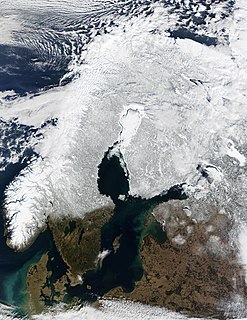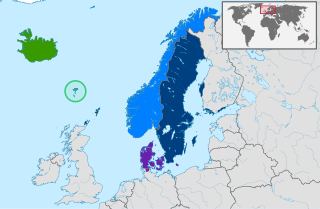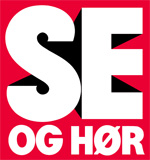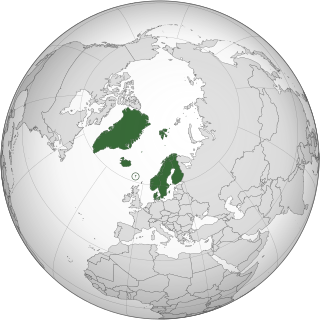Related Research Articles

Scandinavia is a subregion in Northern Europe, with strong historical, cultural, and linguistic ties between its constituent peoples. In English usage, Scandinavia most commonly refers to Denmark, Norway, and Sweden. It can sometimes also refer more narrowly to the Scandinavian Peninsula, or more broadly to include Finland, Iceland, and the Faroe Islands.

The Scandinavian Peninsula is a peninsula located in Northern Europe, which roughly comprises the mainlands of Sweden, Norway and the northwestern area of Finland.

The Nordic Council is the official body for formal inter-parliamentary Nordic cooperation among the Nordic countries. Formed in 1952, it has 87 representatives from Denmark, Finland, Iceland, Norway, and Sweden as well as from the autonomous areas of the Faroe Islands, Greenland, and Åland. The representatives are members of parliament in their respective countries or areas and are elected by those parliaments. The Council holds ordinary sessions each year in October/November and usually one extra session per year with a specific theme. The council's official languages are Danish, Finnish, Icelandic, Norwegian, and Swedish, though it uses only the mutually intelligible Scandinavian languages—Danish, Norwegian, and Swedish—as its working languages. These three comprise the first language of around 80% of the region's population and are learned as a second or foreign language by the remaining 20%.

The North Germanic languages make up one of the three branches of the Germanic languages—a sub-family of the Indo-European languages—along with the West Germanic languages and the extinct East Germanic languages. The language group is also referred to as the Nordic languages, a direct translation of the most common term used among Danish, Faroese, Icelandic, Norwegian, and Swedish scholars and people.

The northern region of Europe has several definitions. A restrictive definition may describe Northern Europe as being roughly north of the southern coast of the Baltic Sea, which is about 54°N, or may be based on other geographical factors such as climate and ecology.

Rotary International is a humanitarian service organization which brings together business and professional leaders in order to provide community service, promote integrity, and advance goodwill, peace, and understanding in the world. It is a non-political and non-religious organization. Membership is by invitation and based on various social factors. There are over 46,000 member clubs worldwide, with a membership of 1.4 million individuals, known as Rotarians.
The Nordic Council Literature Prize is awarded for a work of literature written in one of the languages of the Nordic countries, that meets "high literary and artistic standards". Established in 1962, the prize is awarded every year, and is worth 350,000 Danish kroner (2008). Eligible works are typically novels, plays, collections of poetry, short stories or essays, or other works that were published for the first time during the last four years, or in the case of works written in Danish, Norwegian, or Swedish, within the last two years. The prize is one of the most prestigious awards that Nordic authors can win.

Se og Hør is a TV guide and celebrity journalism magazine published in three independent versions in Denmark, Norway and Sweden by the Danish company Aller Media. The Danish version is the oldest. The Danish and Swedish editions are published weekly, the Norwegian, the largest of the three, twice a week. It is the largest circulation illustrated weekly in all three countries; the Norwegian version has sometimes had the largest weekly circulation in Scandinavia.

The Nordic Council Music Prize is awarded annually by NOMUS, the Nordic Music Committee. Every two years it is awarded for a work by a living composer. In the intervening years it is awarded to a performing musician or ensemble.
The Nordic Football Championship was an international football competition contested by the men's national football teams of the Nordic countries. In the first tournament played 1924-1928, only Denmark, Norway and Sweden competed, but Finland joined for the second tournament, and at the last tournament played in 2000-2001, Iceland and the Faroe Islands also competed.

Gamereactor is a Scandinavian online media network covering video games in multiple languages and a former print magazines network. In 2013, it was "one of the biggest games publications in Europe" according to Develop.

Foreningen Norden, Föreningen Norden (Swedish), Norræna félagið (Icelandic), Norrøna Felagið (Faroese), Peqatigiiffik Nunat Avannarliit (Greenlandic) and Pohjola-Norden (Finnish), The Norden Associations, sometimes referred to as The Nordic Associations are non-governmental organisations in the Nordic countries promoting civil cooperation between the Nordic countries. Established since 1919, there are Norden Associations in Sweden, Norway, Denmark, Finland, Iceland, Greenland, the Faroe Islands and Åland. Since 1965 these national branches are grouped in an umbrella organisation Foreningene Nordens Forbund (FNF), The Confederation of Norden Associations. The co-operation between the Nordic countries include projects such as Nordjobb, Nordic Library Week and Norden at the Cinema.

The Nordic countries are a geographical and cultural region in Northern Europe and the North Atlantic. It includes the sovereign states of Denmark, Finland, Iceland, Norway and Sweden; the autonomous territories of the Faroe Islands and Greenland; and the autonomous region of Åland.

Aller Media is a magazine publisher in the Nordic countries, headquartered in Copenhagen, Denmark. It publishes Elle, Cafe, Familie Journalen, Femina, Allers and Se og Hør.
The 2025 UEFA Women's Championship will be the 14th edition of the UEFA Women's Championship, the quadrennial international football championship organised by UEFA for the women's national teams of Europe. It will be the third edition since it was expanded to 16 teams. The host is expected to be selected in December 2022. It is expected to return to its usual four-year cycle after the previous tournament was delayed to 2022 due to the COVID-19 pandemic.
Nordens Frihet was a Swedish language anti-Nazi weekly magazine that was published by Samfundet Nordens Frihet, an association established to support the independence of the Nordic countries. The magazine existed between March 1940 and December 1945.
References
- 1 2 3 4 5 "Magazines. Nordic countries". Rotary Club of Dewitt. Retrieved 14 September 2022.
- 1 2 "Rotary Norden". The Rotarian. p. 50. ISSN 0035-838X.
- 1 2 3 4 "Tidsskriftet Rotary Norden" (in Norwegian). Norsk Rotary Forum. Retrieved 14 September 2022.
- ↑ Maj-Britt Höglund (2015). "The Absent Female Rotarian in Finland: A Critical Discourse Analysis of Rotary Norden". In Tiina Mäntymäki; Marinella Rodi-Risberg; Anna Foka (eds.). Deviant Women: Cultural, Linguistic and Literary Approaches to Narratives of Femininity. Frankfurt am Main: Peter Lang. p. 157. doi:10.3726/978-3-653-03319-9. ISBN 978-3-631-64329-7.